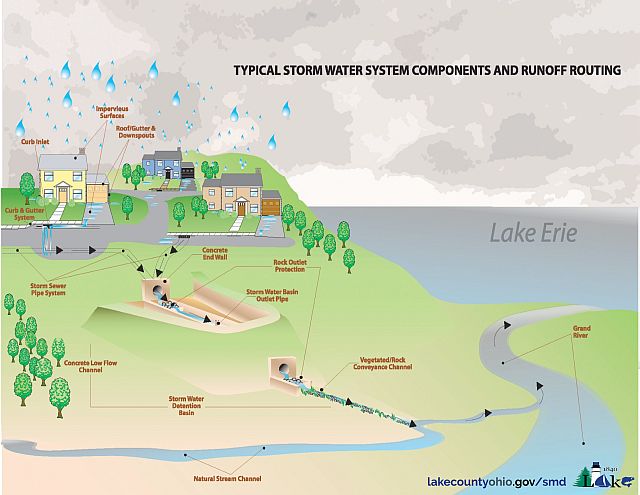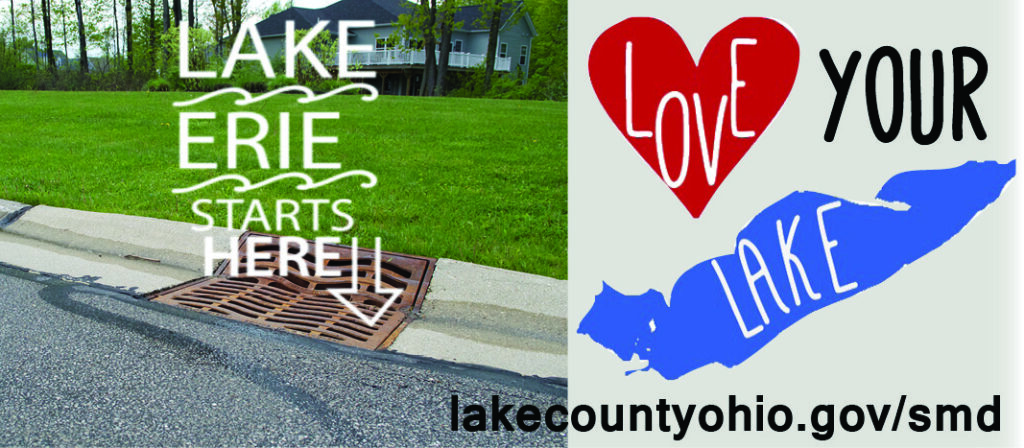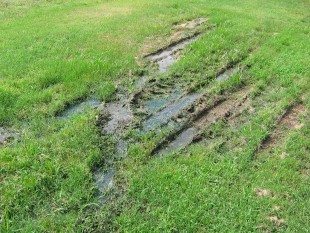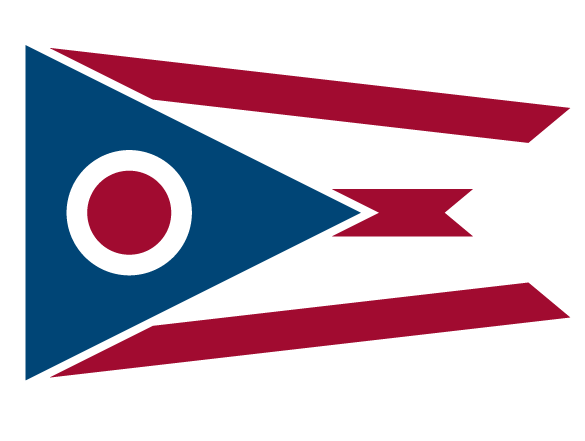What is Stormwater
Where does our water go?
All the water we use inside our homes goes directly to the sanitary sewer and then to a waste water treatment plant or our household sewage treatment. The cleaned water is released into an area stream or into the ground in our backyard.
What about all the water outside of our homes, like the rainwater that falls on our roofs, lawns, driveways, roads, streets, roadside ditches and parking lots? Where does this water go? It is not always easy to tell where this “STORMWATER” goes after it gets to the gutter, storm drain, street or ditch. The stormwater flows from these places to our creeks, streams, and lakes, BUT IS NOT CLEANED before it gets there.

What is the problem with stormwater pollution?
Rainwater from roofs, lawns, driveways, streets, roadside ditches and parking lots in Lake County drain to area creeks and rivers and then to Lake Erie. This rainwater has a direct impact on some of our greatest assets in this area. We not only affect the health of our creeks, but the health of our Lake, its beaches, and our drinking water supply.
Stormwater picks up trash and pollution. Examples include oil and antifreeze that drips from our cars, excess fertilizer and pesticides from our lawns, litter, grass clippings, leaves, and pet waste. Once pollution is picked up by the rainwater it moves through gutters, storm sewers and ditches to our creeks, streams, and lakes where it can cause health and safety problems for us and the living things in them.

Managing Stormwater Is The Key To Keeping Water Sources Clean
Stormwater runoff is one of the main threats to our lakes and rivers. All stormwater in Lake County eventually flows into Lake Erie. Which means it’s very important that we work together to keep our creeks and streams healthy!
What can you do?
There are many ways you can help keep our water clean, save money, and prevent problems. Check out all the ways you can keep our water healthy, fix drainage problems, and save money:
Where do I dispose of Pharmaceuticals?
Pharmaceuticals and Our Waters – Both prescription and non-prescription drugs are being found in our rivers, streams, and ground water. These drugs are considered to be “emerging contaminants of concern” partly due to the harmful effects that low concentrations are already having on the fish population. Our existing waste water treatment plants and septic systems are not designed to remove these contaminants. A certain amount of these contaminants can be reduced with the use of pharmaceutical drug disposal bins instead of flushing unwanted drugs down the toilet or putting them in the trash.
Where To Find A Drug Disposal Bin
Take Pharmaceuticals to a collection bin at one of the convenient drop-off locations. To find a location near you and for more information, contact the Lake County General Health District at (440) 350-2543 or visit: www.lcghd.org/pharmaceutical
Where do I take my un-wanted paint?
To dispose of latex paint, open the can of paint somewhere out of the rain and snow and allow the paint to dry out. You can even add kitty litter to the paint to help it dry faster. Then dispose of the paint with your household trash. Dispose of oil-based paints at the Lake County Household Hazardous Waste Collection Dates.
Remember, never dump unused paint down any drain, especially a storm drain or ditch!
How can my septic system cause stormwater pollution?
If you have a household sewage treatment system, regular maintenance is necessary to ensure your system functions as designed. Not only will regular maintenance save you money, but it will also help prevent storwmater pollution and keep sewage out of our waterways. For more information visit the Lake County General Health District website at http://www.lcghd.org/operation_maintenance
If your system is not functioning as designed, sewage may appear on the surface of the ground. The sewage may then be washed away with stormwater, causing stormwater pollution.

Sewage surfacing from a failing household sewage treatment system

